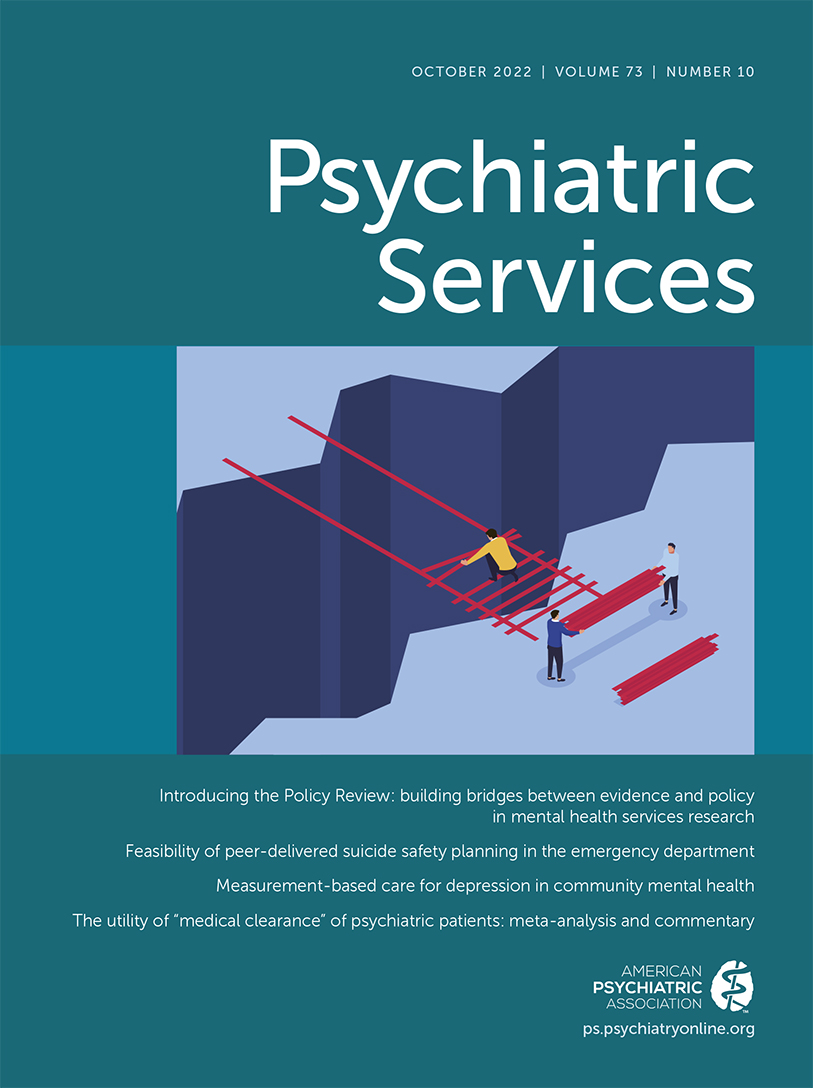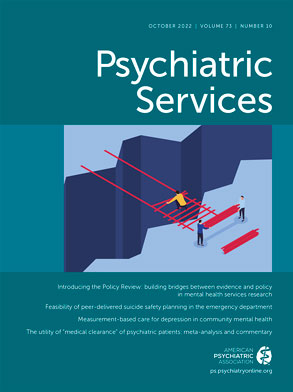The punitive involvement of individuals with serious mental illness within the legal system remains a disturbing reality and is a neglected component of the U.S. mental health crisis. Compton and colleagues (
1) report novel data that serve as a clarion call for broad, systems-level interventions to support and protect those living with serious mental illness. In a targeted community clinic sample, the authors found that 71% of patients with serious mental illness had been arrested, with an average of 8.6 arrests throughout their lifetime. Although previous studies have elucidated potential interventions to curtail this phenomenon, Compton et al. argue that more detailed information is needed “for upstream interventions to be best informed and most effective.” Thus, the authors sought to identify the specific charges brought against individuals with serious mental illness, as well as clinical and sociodemographic risk factors increasing their risk of arrests.
Anecdotally, along with countless colleagues, we have repeatedly observed the entanglement of people with serious mental illness in the legal system. One example is a 40-year-old African American male with a psychiatric history of schizophrenia and cannabis use disorder who was subjected to months of involuntary hospitalization on a forensic unit for competency restoration. His charge? “theft by taking” and “criminal trespass” after stealing French fries at a fast-food restaurant. A 30-year-old Caucasian male maintaining his sobriety from multiple substances faced an impending drug possession charge that could derail his progress with the most minor misstep while on bail. Nevertheless, he was committed to maintaining employment, attending substance use peer support groups, and participating in psychotherapy in hopes of dissecting the life events that fed his addiction. A fundamental piece for the well-being and recovery of these two individuals was clear: successful navigation of a complex, punitive, and demonstrably racist and classist legal system.
Harsh sentences, monetary fines and obligations (e.g., paying for ankle bracelets and monitoring), prolonged hospitalizations for the purpose of competency restoration, and disrupted community treatment plans dramatically shift the trajectories of those with mental illness and criminal legal involvement away from recovery. Compton et al.’s findings quantitatively encapsulate patient experiences such as these, succinctly transforming them into data points that can inform clinical practice and societal policy. Mirroring our experiences, the authors (
1) found that misdemeanor charges of criminal trespass, willful obstruction of law enforcement officers, and disorderly conduct were the top charges among individuals with serious mental illness in their study sample. In other words, nonviolent offenses were more common than violent offenses such as aggravated assault. Moreover, low educational attainment was the strongest predictor of the number of arrests, in addition to African American race, the presence of a substance use disorder, and the presence of a mood disorder.
As Compton et al. encourage policy and programmatic solutions to reduce arrests and incarcerations, a collaborative approach is key. Members of the mental health treatment team must engage across disciplines and with legal case managers, officers of the court, and mental health advocates to both inform systems-level change and assist individual patients caught in the complex legal system. And no one is better equipped for doing so than forensic peer specialists. They not only have lived experience with mental illness and incarceration but also tend to be a more diverse—and representative—group racially, educationally, and socioeconomically than other mental health professionals. On a policy level, we must advocate for support of forensic peer specialist training programs and for reimbursement of their services by payers. Interpersonally and professionally, we must use our privilege to increase peer specialists' involvement and to amplify their voice. Practically, awareness of the potential for legal system involvement in the identified populations can also inform treatment risk-and-benefit consideration as well as anticipatory guidance about matters such as the right to remain silent and whom to call if and when arrests occur.
While we agree with Compton et al.’s recommendation that “mental health professionals . . . ask regularly about clients’ legal involvement,” these professionals must be educated about inequities in the legal system and identify and address their own potential biases against African Americans and those with low educational attainment, substance use disorders, or legal histories. The conflation of criminal legal involvement with dangerousness and the failure to appreciate systemic racism and classism in the criminal legal and mental health systems can perpetuate the unjust treatment this population already experiences in both systems. Noting potential barriers to patients’ disclosure about such matters is also important: apprehension in discussing their legal status, confusion regarding their place within a complex legal system, and comprehension and communication limitations due to their mental illness and possible intellectual and language disorder comorbidities.
Compton et al. have provided a valuable resource for responding to the overrepresentation of individuals with serious mental illness in the legal system. Our hope is that the field leverages its resources, privilege, and expertise to answer the call for better interventions through multidisciplinary multisystemic advocacy that meaningfully addresses this powerful social determinant of mental health.

